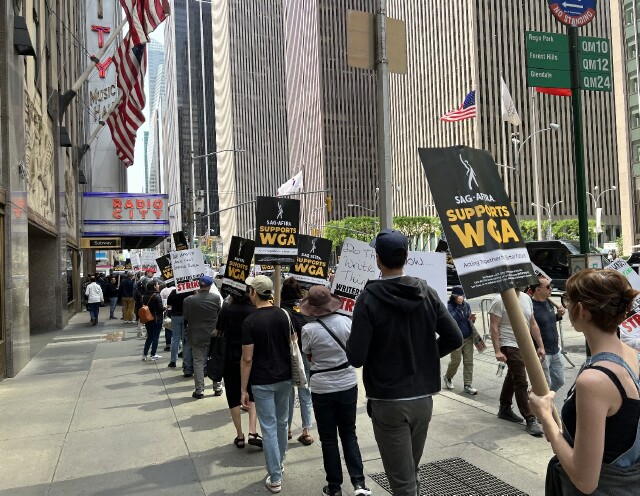WGA Strike Forecast; Generative AI Disrupts Cannes Plans

The potential for the Writers Guild of America (WGA) strike to continue through the summer became more likely with last week's agreement between the Directors Guild of America (DGA) and the film and TV studios. Following the vote of more than 90% of the Screen Actors Guild (SAG) authorizing their union leaders to strike when their contract expires at the end of this month, they're certain to join ranks with WGA. The dynamics are in place for a drawn out negotiating process unless something breaks the logjam.
If the DGA had failed to reach an agreement, the triumvirate of writers, actors and directors would have forced the studios to settle. With directors on board some work will continue.
A SAG strike will limit production to game shows, leaving only series already "in the can," reruns, reality series, sports, news and selected events. In my recent MediaVillage interview with Dennis Miller, the new president of The CW Network, we discussed the work-for-hire economics of TV production introduced by Netflix several years and now standard across the industry. Miller's decision to break from the new norm and offer "back-end" shared profitability to partners may prove to be a turning point that could lead to a resolution. The core question is whether films and TV programs are a creative endeavor deserving of financial reward with success or a job-for-hire with a defined "one-off" salary structure.
The only security offered to the vast majority of writers and actors is their union membership. Unless the studios agree to provide some financial upside to union members, the strikes will continue. The future of generative AI as a creative tool is certainly a game changer, but not sufficiently defined and an issue the unions would be wise to delay for as long as possible.
Generative AI
ChatGPT is only six-months old but has elevated generative AI to the hottest industry topic that promises to dominate discussions among the thousands of advertising and media professionals gathering in Cannes next week for the International Festival of Creativity. In an industry that has navigated through technological upheaval for decades, the rapid acceleration of generative AI and VR brings a different set of realities that are especially relevant to the creative community. From the printing press to radio, broadcast television, cable television, the Internet and mobile the technological advances have transformed content distribution. With AI and key aspects of the Metaverse, the creative community is confronted with a looming metamorphosis in the role, function, process, value and human contribution at the foundation of content creation. For the next 36 months, all the disruption inherent in content distribution will be at a stand-still as industries, and especially advertising and media, absorb the radical advances in artificial intelligence and advanced machine learning.
Those who believe AI is either a passing fad or a simple tool fail to comprehend the impact it will have on the role and purpose of human intelligence. Everything that we depend upon the human brain to create will be more advanced in machines. Yes, AI depends on human input and prompts, but AI is already informing strategy and self-educating to provide both input and output. AI demands a reinvention of content creation processes and a redefinition of the role of content creators. For the media side of the advertising business, AI is already being used to develop strategic guidance for programmatic models.
There's no part of society and culture that will not be impacted by AI. It will be at the forefront of conversations in Cannes but most of those conversations will be comparable to discussing the Internet soon after the Mosaic browser was introduced in 1993 or the iPhone was introduced by Steve Jobs in 2007. Those who express confidence in the industry's ability to adapt know little about the embedded inertia that exists across our business. I will do my best to keep you ahead of the knowledge curve. I promise it will not be easy for any of us.
Trump Indictment and Media Ecology
The request by President Biden to his cabinet officers to resign now if they do not intend to continue in their roles through the 2024 election cycle is a positive indication for the Democrats. As I wrote in my February 2020 column When Politics, Media and Vaudeville Intersect, the best way to overcome Donald Trump's superiority in media coverage is to build an always-on strategy for dominating the news cycle. As president, Biden has the power to generate personal coverage but he will be dependent on surrogates. Over the next three months, expect leadership resignations across the administration as Biden replaces those who are unable to effectively carry the torch and command media attention with leaders who can command media attention and dominate the news cycle in short spurts.
Network Television Upfront Economics
Post-Cannes, MediaVillage Education Fund members and subscribers to The Myers Report will receive an update on Upfront negotiations.


